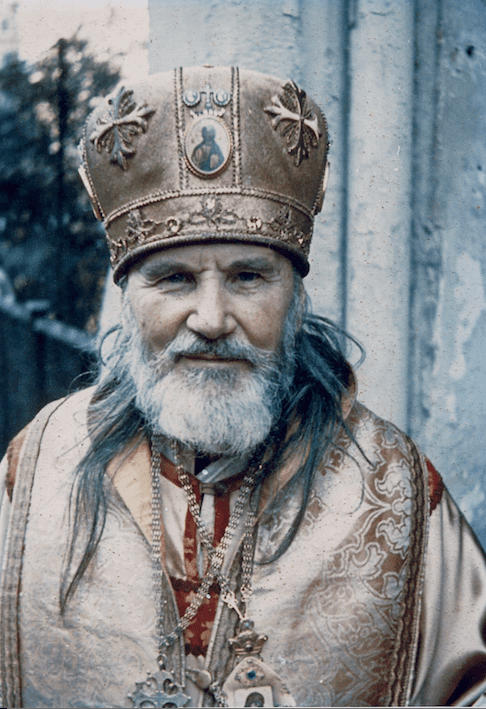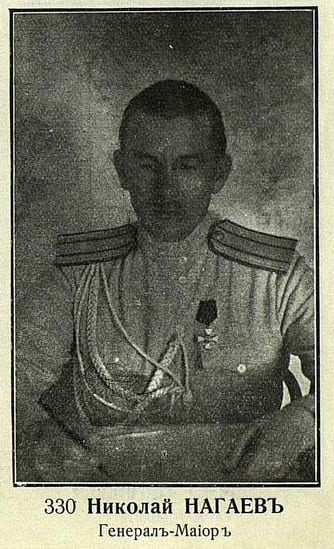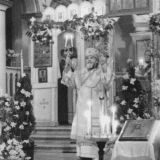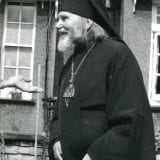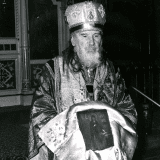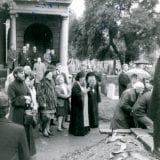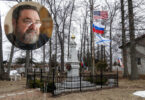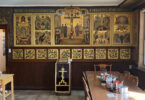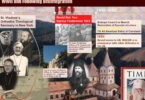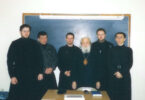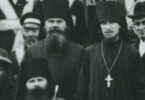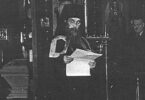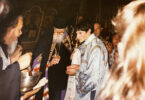On the 4/17, October, 1976, Archbishop Nikodem of Richmond and Great Britain reposed in deep old age, being 93 years of age. From his early childhood and youth, Vladika lived in piety and devotion to the Church. His whole life was perhaps most distinguished by his humility and his fleeing from the glory of men. In the world he had enlisted in the Imperial Army of his Russian homeland, and he rose through the ranks to become a general. As Dostoevski has said, in old Russia, the rank of general was something thought of, and a position greatly desired for its prestige and status. It was something which those with the mind of this would take delight and pride in, but not so Vladika Nikodem. His secular name was Nikolai Vasilievich Nagaev, and the story is told by an acquaintance of his, who knew him in Yugoslavia, of their first meeting. The acquaintance asked Vladika’s name. “Nagaev” answered Vladika. “Not General Nagaev?” asked his acquaintance. Usually one would have expected the answer: “Yes, that is I am; I served in such-and-such a regiment, fought in this-and-that battle,” etc., etc. But nothing of the sort from Vladika. Although he had received the Order of St. George for bravery, the highest awards of military distinction in Imperial Russia, he did not boast or make display of his achievements. He answered humbly: “Yes, I was once a general.”
Many years later, when he was already a bishop and living in England, he was asked how he came to take up the monastic discipline. Again he would say nothing about himself, but he answered: “Oh, that is a long story and I have forgotten it, but I will tell you how my Elder became a monk.”
In the world, Vladika had been married but he was very shortly widowed, and like so many other Russian patriots found himself after the Civil War in exile in Yugoslavia. Here he joined the Brotherhood of the Righteous Seraphim of Sarov, a confraternity devoted to the deepening of its members1 understanding of the Church typicon and the traditions of piety. At this time, Vladika was a layman, and yet he was distinguished by his daily attendance at the church services, where he always stood on the soleas (kliros), and helped with the chanting and reading of the services.
Thus he trained himself in piety, and came to God-knowledge.
Never in his life did he receive formal theological training, and yet as was to be shown forth in the last months of his life, when a great temptation and trial came upon him, he had insight and understanding of our saving Faith, such as few in our days possess. He learned his theology in church, in prayer, in worshipping the Holy Trinity. As Vladika himself wrote: “God does not reveal His Mysteries immediately. The training of the spiritual life is a slow and gradual process, during which many mistakes occur.” Thus we glimpse how God’s mysteries were revealed to him, not through book-learning and theology courses, but by struggling in piety. The things of God are suffered and not learned, say the fathers.
For monastic Vladika taught a complete renunciation of the world, although his advice was always tempered with a wise discretion. He once told me story of a monk of the desert who had a pet rooster, which woke him each morning. The monk was very attached to his pet; but one morning the devil sought to snare him by this attachment.
The rooster, rather this time the devil, came to his cell door and scratched and crowed, and made such a din that it was obvious something was wrong. The monk hurried out, without guarding himself with the cross or prayer, to see what was up. The rooster by running a short distance and then anxiously turning back from time to time, gave the monk to understand that he should follow him. The monk did so. And the rooster led him high up into a mountain, and it was only when he was led into impassable places and trapped over a chasm, that the “rooster” disappeared revealing its true identity. Perhaps for some, gust a quaint story; but in it Vladika was trying to impart some teaching: the need for unattachedness to anything of this world, the need for attentiveness, and of turning always to our Saviour — these are me lessons which Vladika wanted to impart. But he was not fanatical or extreme in his preaching of separation from the worldly interests; “Renunciation not of life itself in the world, but of its dark side is necessary,” he wrote. He realized also mat only to that extent that one separated oneself from concern with that dark side one become enlightened: “You want to entrust your soul to Father X,” he wrote, “but he, you write, doesn’t give you any, spiritual guidance. This means, that he does not possess the gift (lit. bear on himself) of eldership.” Vladika then explained that this was because this father was involved in various concerns and enterprises, and he concluded: “But eldership requires separation from wordly concerns and a whole prayer-life.”
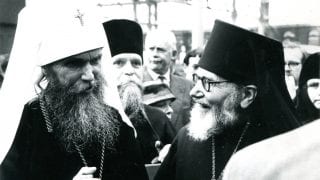
1965: Bishop Nikodem welcomes arriving from France Metropolitan Philaret at Waterloo Station. 2nd l.: Archdeacon Gelassy; 3rd l.: George Knupffer. (Source: Michael Knupffer)
Vladika, then, lived as a layman in Yugoslavia, although he was devoted to the Church and never missed a service. At this time, too, he became a spiritual son of the renowned Athonite Elder, Father Kirik, whom he always spoke of as his Elder, and he enjoyed the spiritual direction of such fathers as Metropolitan Antony, and the Elder Ambrose of Milkovo. He received the monastic tonsure and was named after the Righteous Nikodem the Prosphora-Baker of the Kievan Caves Monastery. This righteous father is celebrated by the Church on 31st of October, on the same day as St. Aristoboulos the first Bishop of Britain, and it was as Bishop of Britain that Vladika was to end his days. There is a striking similarity in one respect between the holy Nikodem of Kiev and our Vladika. Of the first is hardly anything known, except that he was the co-struggler of St. Spiridon of Pechersk, and that he continued in his obedience until the end of his days. So also did Vladika Nikodem, although extremely aged, continue to administer his diocese and celebrate the Liturgy until the last weeks of his life, knowing that, despite his weakness and infirmity, there was no one to replace him.
Vladika was ordained to the diaconate and the priesthood by Metropolitan Anastasy, being made a priest in 1943, and served during the War as an army chaplain. Later Father Nikodem moved to Munich, where after the War, he helped to establish the Monastery of St. Job of Pochaev, for whom he had the greatest love. Soon, in 1948, he was assigned as the parish priest of a church at Osier- la-Ferriere in France, and for a time also he served with Archbishop Leonty in Geneva. As Archimandrite he was sent to England in 1952 to administer the diocese there, and he remained there until his repose twenty-four years later.
In 1953 the Synod decided to raise Archimandrite Nikodem to the rank of Bishop, making the Preston diocese suffragan to the Western European one. Vladika Nikodem’s consecration was celebrated on the 5/18th July, the feast of St. Athanasios of Athos and of St. Sergei of Radonezh, 1954, in the Memorial Church of the Tsar- Martyr Nicholas II in Brussels, Belgium. The Blessed Archbishop John Maximovitch (then head of the Western European Diocese), Bishop Alexander, and Bishop Leonty, performed the consecration; and Vladika was appointed Bishop of Preston. Later the title was changed to Bishop of Richmond. In 1963, the diocese was made independent of the Western European Diocese, and Vladika was therefore made an Eparchial Bishop rather than a suffragan. On the Feast of the Protection of the Mother of God, 1968, Vladika also learned that the Synod had raised him to the rank of Archbishop.
One of Vladika’s spiritual children, who nursed him through the last days, describes his end thus (we have corrected the English a little and translated Russian words, but otherwise left the account as we received it, because it has a warmth that we cannot hope to imitate): “You want me to tell you, when I can, about the repose of Vladika. There is so much to tell, and I am so full of feelings, that you will not perhaps understand me rightly. On September 26th (n.s.), the Exaltation of the Holy Cross, Vladika did not feel well — his head ached at the back. But he still celebrated and elevated the Holy Cross, but he was exhausted when we took him to the Podvorie (Church-house). Next day, he was unable to celebrate the Divine Liturgy and rested. On that day, some rash appeared on his forehead and his temperature slightly raised, Dr. Guerken came and said that it looked very much like shingles, and gave all that was necessary to help. Later it was obvious that we must have another opinion, and the situation deteriorated. Vladika’s face became swollen and painful, and he could not eat much, nor wanted to, as it was painful to swallow. He refused to enter the hospital, and even earlier he always asked me not to take him to hospital in case of serious illness, as he wanted to die in his own cell, and not be moved anywhere. I did my best to make him as comfortable as possible, and was near him all the time, serving him, acting like a nurse and everything. I fed him by spoon and gave him drink. He wanted me to read him the prayers, morning and evenings, and asked me to read very slowly and very quietly — which I did. He received Holy Communion twice — at the beginning of his illness and at the very end. Also, when I realized that he was getting weaker, I asked Father Nicanor and Father John to serve Unction for him, which they did. Vladika was conscious all the time during his illness, only he could not talk very much due to his weakness… Before his illness he prayed by Jesus Prayer having a prayer-rope. In bed he prayed just the same, and now and again he crossed himself over and over again, and he crossed us all… Vladika blessed those that came, and then many, many times repeated: “The blessing of the Lord be upon you, always now and unto the ages,” as if he could see all his flock in front of him. I could cry but I didn’t. Vladika’s eyes were closed because of the swellings on his face, and the eyes were particularly bad… He tired easily and kept going to sleep during the day. But at night the pain on his face (although it later became better) was worse and it itched. In order not to cry out, he started singing “O Virgin and Theotokos,” or “Blessed is the Kingdom of the Father, and of the Son, and of the Holy Spirit” (beginning of the Divine Liturgy), and he went on repeating parts of the divine services. He sang at the top of his voice, and apparently this helped his pain… The last three nights, he mentioned names, suddenly during the night. He said: ‘Averky,'[1] Archbishop Averky of Syracuse, New York, and Holy Trinity Monastery, reposed 31st March/13th April, 1976. and pointed to the clouds; and later ‘Nikon[2] Archbishop Nikon of Washington and Florida, reposed 22nd August/ 4th September, 1976. showed everyone the path to take;’ and then: ‘God is calling everyone to appear before His presence; everyone must remember this. And, now, — I have reached Brompton’ (the cemetery where he was laid to rest). Vladika remembered many people who are ill or who have recently died. He said: ‘Ah, Alexandra Petrova’ (reposed Epiphany 1972), and later he said: ‘I saw Arapov.’ I did not know who he was, and Vladika did not answer me then. But in the morning we were notified that a Mr. Arapov had passed away. Vladika kept saying: “the confessors of God…” several times.
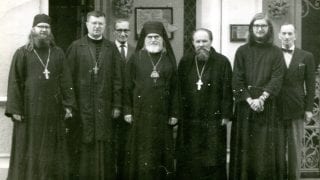
1968: Outside Emperor’s Gate church: (l.-r.) Father Mark Meyrick, Archimandrite Victor Jankovich, Bishop Nikodem, Father Nicholas Troitsky, Brother Angus Pobjoy, Mr Krasnopolsky. (Source: Antonina Ananin)
I think he was remembering all the clergy in concentration camps, about whom I had only recently read for him. During this, Vladika was so upset and he started crying. He felt much for those saintly people who are suffering for nothing, because they did not do anything wrong, but the opposite; they preached and served God and serve Him. I constantly asked Vladika if he experienced the pain, or did he need anything; he was always so humble and grateful for everything.”… Vladika grew weaker. “He could not express himself, and simply started singing ‘Let us who mystically portray the Cherubim’ — you know, the ordinary one we usually sing — and he sang it to the end. Only later I realized that it was easier for him to express what he wanted to say in the ‘Let us who mystically.’ He wanted me not to worry but to leave ‘every earthly care’ to God.” Again Vladika became weaker and “I asked Father Nicanor to read the last rites, while we gave oxygen. Vladika was conscious but restless, and he called several times — his mother whom he loved very much. He had kept his mother’s handkerchief on the stand with the icons, and he treated it as something holy, and kissed it each evening after his prayers and after he had kissed all his icons. And he told me sometime ago to put the handkerchief in his hand when he dies, which I did. At times his breathing became easier and he slept. The doctor left, I sat beside him and Father Nicanor also stayed and watched and helped a little. At times Vladika became worried, as if he felt in his sleep (and this was not really a sleep) something frightening. Then I talked to him (remembering his telling me that when one dies the evil spirits try to frighten the soul, and then the Angel takes the souls and guards it) — ‘Vladika, be at rest, do not be frightened — they will not touch you. Remember? — Your Angel. He is with you; he will guard you.’ No sooner had I said these words, Vladika became so quiet and peaceful. And several times this was repeated and each time I comforted him and reminded him that he is was amongst the Holy Angels, and that the Holy Mother will take him and comfort him; and he was at peace and held his cross all the time.
So evening came; there was no Vigil at the Podvorie that night (Saturday). People came up and prostrated and asked his forgiveness. He felt it all and this upset him a little especially if the voices he heard were noisy. Eventually they all left… I said prayers and looked at Vladika’s beloved face, so kind and so gentle, and I remembered so much — how good he was, how noble, and strict sometimes. I took my prayer book and thought — I will read him his beloved Akathist to Our Lady. Suddenly, I noticed that his breathing changed suddenly. There was a pause, and I started giving him oxygen again. He opened his eyes. Vladika looked so quiet. He made a sign that he did not want more oxygen and moved the mask away. He looked up, and gave a deep breath, and with his last breath his soul left his body. I held his hand — I felt that our beloved Vladika was no more with us in this world. I realized then that the body is only a shell. I had the feeling to look up, as if I could find Vladika there. At the same time there was a mysterious feeling in the air. Father Nicanor confirmed that Vladika had passed away and started preparing the body.”
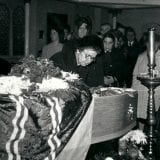
His secretary Antonina V. Anania bids farewell to Vladyka Nikodem’s mortal remains. October 17, 1976
So Vladika Nikodem quietly and peacefully passed away on the feast of St. Hierotheos the bishop of Athens, early in the morning on the day of the Resurrection, Sunday. Later in the day the faithful gathered at his bedside and chanted the first memorial service, holding the beeswax candles that Vladika had specially laid by for that purpose. He was later taken to the Russian Church of the Dormition of the Virgin, where on the following Thursday, his funeral was celebrated by Archbishop Antony of Geneva.
We hope that our readers will not be scandalized that in this small tribute to Archbishop Nikodem we have included such a long, and very personal description of his last days and his repose. We are instructed by the Apostle: Remember them which have the rule over you, who have spoken unto you the word of God: and observing the result of their conduct, imitate their faith.” (Hebrews 13: 7).
These words of Vladika’s spiritual child, telling of his end, contain much that is valuable and instructive for those that have ears to hear. They tell us of the “result of his conduct,” or as the King James Version has it, “the end of his conversation,” and we can see that he was indeed granted a Christian end to his life, painless, blameless and peaceful, for although he was tried with one last illness, although it seems that he was tempted towards the end by the evil one, yet he remained steadfast and in the end his soul was taken peacefully and quietly. May God grant us strength that we may now imitate his faith. Those of us who knew Vladika know of his steadfast witness to Orthodoxy, this tested as in fire when, in the last few months of his life, the evil one stirred up dissension in his diocese over the exercise of oeconomia. Vladika then by his actions made clear the teachings of the Orthodox, although his administration of the whole affair was worthy of every approbation, yet when some would have made an issue of the matter and it was brought before the Holy Synod, Vladika then showed us yet another example — that of humility and patience — in awaiting Synodal confirmation of his actions. Those of us that knew him have witnessed also his standing in prayer before the Master in the divine services, and have seen how with reverence and piety he served at the holy altar. Although Vladika was a man that had to be sought out (for he would never put himself forward), he was undoubtedly one also that possessed a gift of eldership as can be confirmed by those who were his spiritual children. But even for those that did not know him, there is an example and model to be found in the very sketchiest outline of his life: that a man of such extreme old age should continue to celebrate the services and administer a diocese with such steadfastness and resolve is in itself a witness to his faith. He was burdened by old age; he lived in a foreign country with few of his own people, and those poor and scattered far and wide; his flock was scattered among the tribes of the nations, and among such tribes of the nations, too! — among a people who are noted for their indifference to piety, their coldness, their lack of conscience in matters of Faith. Yet we who are young, and are beset by no great trials are ever ready to retire from the arena, to seek some solace and comfort here. Vladika was not such a man, he was a noble contestant and one that finished his course nobly also, reaching forward only to the crown of his victory. He who fled the glory and honour of man will now have eternal glory and honour bestowed upon him by our Saviour. We ask all the pious and Orthodox Christians to remember Vladika in their prayers and to have him commemorated in the Liturgy of the Orthodox, and we hope that in return, through his prayers, our Saviour will send down his blessings upon Vladika’s diocese and upon us all, and that He will grant us also to end our days in good confession of the Faith, in piety and in peace. Amen. So be it.

